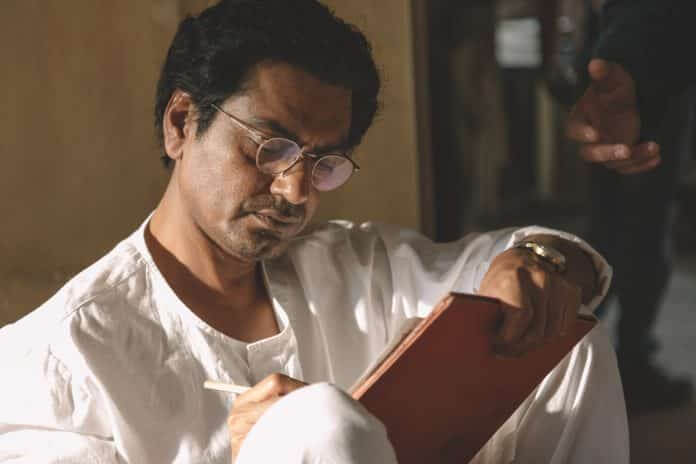Life can be distressing for creative souls who strive to tell the truth, and nothing but the truth. The consequence of their honesty could be killings or attacks, even in a civilised society. Sound familiar?
Indian films Manto and Mehsampur, directed by Nandita Das and Kabir Singh Chowdhry respectively, which premiered at the Sydney Film Festival this year, tackle freedom of expression by showing contentious, complex life chapters of people from the past.

Their chosen characters, Saadat Hasan Manto and Amar Singh Chamkila, don different artistic cloaks, eras, as well as surroundings. In choosing them as subjects, the directors indicate clearly which side of the political fence they are on. The stand is loud and clear against disruptive politics, endangered creativity, and threats to journalism in India.
Nandita introduced her second directorial Manto to the audience with, “I can’t say ‘Enjoy the movie’. Let me say ‘Feel the movie’.” In an intimate, delicate, and candid interpretation, she follows the literary writer played by Nawazuddin Siddiqui through four significant years (1946-1950) of his life. It was a time when he felt conflicted as a Muslim in Mumbai after partition, and moved to Lahore.
The director gently squeezes Manto’s soul and pours it over the big screen. As a bonus, you get a glimpse into the Hindi film industry of the ‘40s. His failing personal and challenging work life, with fluttering images of five short stories he wrote, including Thanda Gosht and Toba Tek Singh, merge seamlessly. India had just achieved independence in 1947, the nation felt split. So did Manto.

Lost in divided India and unhappy in the new Pakistan, the move didn’t go as well for him. Manto missed the vibrant city of ‘Bombay’, his creative inspiration and the literary circle of friends he hung out with. Accused of writing obscene literature, he craved to freely express himself within the comforting confines of his pages. The socio-political landscape wasn’t the best platform for his searing, humane short stories on taboo topics like sex, communal violence and religion.
Then we have Kabir’s inventive and first-rate debut, Mehsampur (in Hindi, Punjabi, and English). Written by Akshay Singh, it scores high on creative originality and finesse. Its hybrid, coarse narrative smoothly dabbles in realism, imagination, voyeurism and fiction as he attempts to explore the mystery behind the deaths of legendary popular stage performers Amar Singh Chamkila and wife Amarjot Kaur.
A fictitious filmmaker Devrath wields the factual, grounded lens with his webcam, mapping real-life characters who knew Chamkila, driving across the dirt and depth of Punjab soil. Real and fictional characters burst forth and merge on screen: a fading actress, Chamkila’s manager, a former partner. The result is visceral, cerebral, and a fine version of verisimilitude that leaves the audience restless and uncomfortable.
Songwriter, musician, and composer Chamkila was a popular stage performer known for his songs on extra-marital affairs, maturing, drinking, drug use, and hot-tempered Punjabi men. His fans loved his naughty take on Punjab’s culture and society but he was panned for his explicit lyrics and provocative songs. Chamkila received many death threats, which he ignored and obviously didn’t care about.
Both Manto and Chamkila were daring and defiant. Chamkila (and Amarjit) was shot dead by anonymous killers in 1988. Manto’s depression due to his creative isolation drove him to alcoholism, and a premature death at 43. What’s dismal is that even today, freedom of expression comes at the risk of grievous harm – we have seen the deaths of vocal liberals in Gauri Lankesh, Narendra Dabholkar, Govind Pansare, and MM Kalburgi, to name a few. They all shared common aspects, the biggest potential threat was their message in local language would convince a wider audience.
Manto is Nandita’s way of responding to the growing intolerant and religious atmosphere. With Kabir, it started off as an obsession for Chamkila. “There was no one like him. Others were just doing folk music, he was commenting on daily life, creating magic.” Then it veered into voyeuristic aspects of filmmaking, “Authenticity can be intrusive on the subject,” says Kabir.
Both the making, and their treatment obviously differ. Manto is immersive, feminine, and soft almost. Mehsampur is invasive, masculine, brutal even. Yet both are brilliant takes, soaked in pessimism, showing us a mirror to the ugliness of times today, across the world, as well as our painful past.
Sydney Film Festival: Decoding Manto and Mehsampur

Reading Time: 3 minutes



